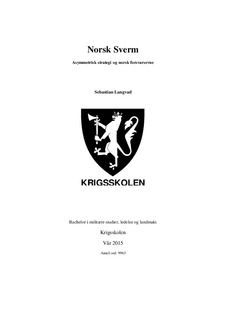| dc.description.abstract | English summary :
In a rapidly changing strategic context, long-standing assumptions regarding military concepts must be re-evaluated. The Norwegian Swarm is a proposed alternative to the current Norwegian landpower operational concept. Any concept must build on a solid theoretical foundation in order to identify strengths and weaknesses as early as possible. This theoretical foundation should rely on rigorous analysis of empirical observations. If not, it runs the risk of recycling established assumptions and does not contribute to a constructive military theoretical debate. The research question of this thesis thus becomes: Can the Norwegian Swarm defeat a Russian limited surprise attack, assessed by empirically based military theory? The premise for the study is a limited strategic attack against Finnmark in the period up until year 2050. NATO-support is eliminated as a factor.
The thesis uses abbreviated dynamic systems modelling methodology and, based on empirical observations, constructs the National Defence Model. The arguments underpinning the model strive to be explicit and transparent, so as to allow further studies to test its validity or expand upon the model. The National Defence Model illustrates that Norway, as a small power with defensive strategic goals, is best served by pursuing a prolonged war against a larger invader. Own forces that are able to infiltrate unseen and attack along multiple axes deliver the best chance of attaining a beneficial casualty rate. Conscious use of strategic communication to shape the dominant narrative appears as an important method of maximizing the probability of victory.
When inserted into the National Defence Model against Russian forces in Finnmark, the Norwegian Swarm is characterized by being a resilient and time-consuming concept. It is very difficult to neutralize, even when the enemy enjoys a highly favourable situation at the onset of hostilities. In this situation, the Swarm likely will have to conduct a prolonged war lasting for months or even years. This thesis does not assess whether Norwegian political and popular will can endure a war of this duration. It does conclude, however, that if Norway is prepared to endure the hardships for as long as needed, the Norwegian Swarm gives the country the ability to independently defeat a limited attack by Russia. | nb_NO |
